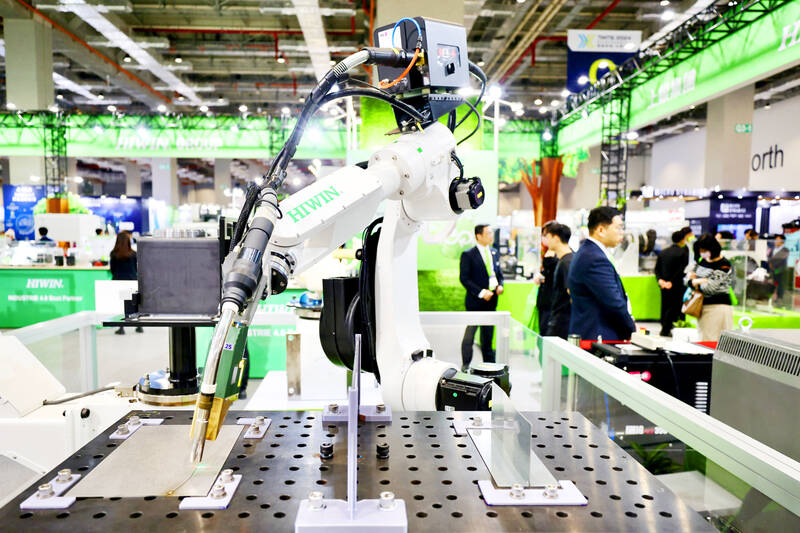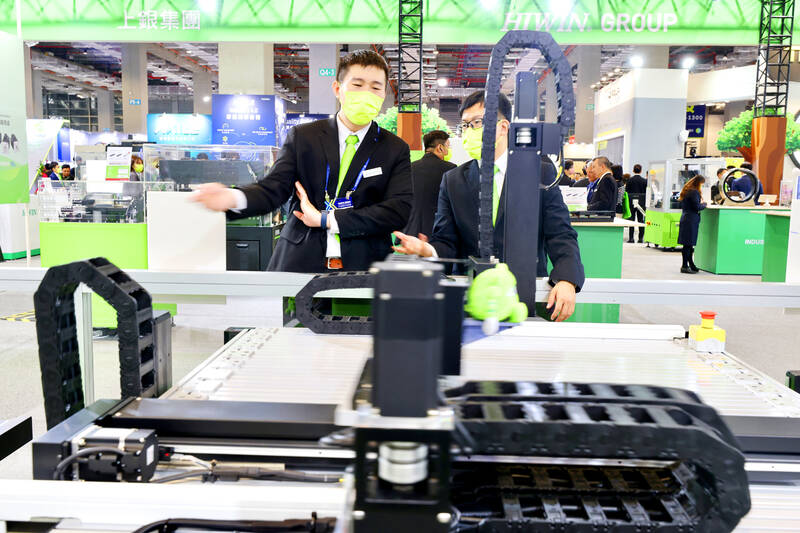Machinery maker Hiwin Technologies Co (上銀科技) expects its business to resume growth from next quarter after hitting a trough this quarter, with revenue expected to grow by a double-digit percentage this year, as demand has shown signs of recovery, company chairman Chuo Wen-heng (卓文恒) said yesterday.
The company witnessed a marked improvement in orders this year and the order visibility for some of its products — such as linear guideways and ball screws — has been extended to up to three-and-a-half months, Chuo said on the first day of the Taiwan International Machine Tool Show.
Chuo said he had observed relatively optimistic sentiment for the machine tool industry this year based on feedback from some buyers and exhibitors attending this year’s show.

Photo: Ritchie B. Tongo, EPA/EFE
Themed “Digital Transformation and Green Transformation for a Sustainable Future,” the show opened yesterday and runs until Sunday at the Taipei Nangang Exhibition Center.
The event features 631 exhibitors and 3,350 booths. More than 4,000 foreign buyers from 47 nation had preregistered to attend the exhibition, which is expected to attract more than 55,000 people, event organizer the Taiwan Machine Tool and Accessory Builders’ Association said.
The nation’s machine tool exports last year fell 14 percent year-on-year to US$2.6 billion due to a slowing global economy and geopolitical tensions. Outbound shipments this year are expected to grow slightly as headwinds remain, the association said.

Photo: Ritchie B. Tongo, EPA/EFE
Chuo said the industry has seen a mild increase in orders for machine tool-related linear-motion components since November last year, but they have not yet returned to the level seen in 2021 and 2022.
Currently, orders for large machine tools — such as those for the aerospace industry, wind turbines, infrastructure projects, semiconductors and automation applications — appear relatively stable, while orders for small and medium-sized machine tools are much weaker, Chuo said.
It might take a few months for the industry to see a more lasting recovery, he said.
Hiwin's consolidated revenue last year fell 15.97 percent year-on-year to NT$24.63 billion, the lowest in three years. From January to last month, the company's cumulative revenue increased 1.5 percent annually to NT$3.51 billion, company data showed.
Tongtai Machine and Tool Co (東台精機) expects a recovery in the machine tool industry in the second half of the year, as firms still face challenges in the first half, such as a ban on exports to Russia and stricter reviews for shipments to Turkey, chairman Yen Jui-hsiung (嚴瑞雄) told the Central News Agency yesterday.
The industry’s overall production value is expected to increase by a single-digit percentage this year from US$3.31 billion last year, Yen said.
Tongtai is focusing on semiconductors, the aerospace industry and electric vehicles this year, and expects orders to sequentially improve from next quarter, especially those from Thailand and Vietnam, he said.
Tongtai, which mainly makes machining centers and lathes, reported cumulative revenue in the first two months of the year rose 11.46 percent from a year earlier to NT$1.12 billion.
The company's consolidated revenue last year fell 7.84 percent year-on-year to NT$7.62 billion, company data showed.

Nvidia Corp CEO Jensen Huang (黃仁勳) today announced that his company has selected "Beitou Shilin" in Taipei for its new Taiwan office, called Nvidia Constellation, putting an end to months of speculation. Industry sources have said that the tech giant has been eyeing the Beitou Shilin Science Park as the site of its new overseas headquarters, and speculated that the new headquarters would be built on two plots of land designated as "T17" and "T18," which span 3.89 hectares in the park. "I think it's time for us to reveal one of the largest products we've ever built," Huang said near the

China yesterday announced anti-dumping duties as high as 74.9 percent on imports of polyoxymethylene (POM) copolymers, a type of engineering plastic, from Taiwan, the US, the EU and Japan. The Chinese Ministry of Commerce’s findings conclude a probe launched in May last year, shortly after the US sharply increased tariffs on Chinese electric vehicles, computer chips and other imports. POM copolymers can partially replace metals such as copper and zinc, and have various applications, including in auto parts, electronics and medical equipment, the Chinese ministry has said. In January, it said initial investigations had determined that dumping was taking place, and implemented preliminary

Intel Corp yesterday reinforced its determination to strengthen its partnerships with Taiwan’s ecosystem partners including original-electronic-manufacturing (OEM) companies such as Hon Hai Precision Industry Co (鴻海精密) and chipmaker United Microelectronics Corp (UMC, 聯電). “Tonight marks a new beginning. We renew our new partnership with Taiwan ecosystem,” Intel new chief executive officer Tan Lip-bu (陳立武) said at a dinner with representatives from the company’s local partners, celebrating the 40th anniversary of the US chip giant’s presence in Taiwan. Tan took the reins at Intel six weeks ago aiming to reform the chipmaker and revive its past glory. This is the first time Tan

CUSTOMERS’ BURDEN: TSMC already has operations in the US and is a foundry, so any tariff increase would mostly affect US customers, not the company, the minister said Taiwanese manufacturers are “not afraid” of US tariffs, but are concerned about being affected more heavily than regional economic competitors Japan and South Korea, Minister of Economic Affairs J.W. Kuo (郭智輝) said. “Taiwan has many advantages that other countries do not have, the most notable of which is its semiconductor ecosystem,” Kuo said. The US “must rely on Taiwan” to boost its microchip manufacturing capacities, Kuo said in an interview ahead of his one-year anniversary in office tomorrow. Taiwan has submitted a position paper under Section 232 of the US Trade Expansion Act to explain the “complementary relationship” between Taiwan and the US